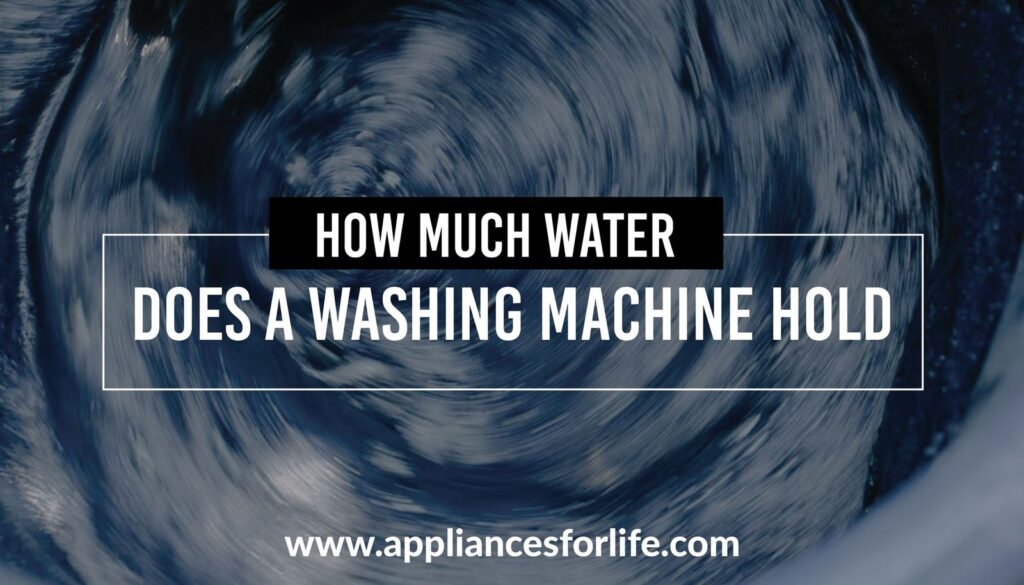- As a washing machine user, knowing the average washing machine water usage will save you from unnecessary stress as you will know the right amount of water your washer needs to wash efficiently. If the question “how much water does a washing machine hold” has ever puzzled you, we have the right answer for you in this article.
If the statistics are anything to go by, then the meteoric rise of the washing machine in the world that we live in today shouldn’t come as a surprise to most of us because we now understand the importance of the machine and how much it brings to our lives. According to the American Community Survey, over 85% of American households own a washing machine, which is only proof of how much people regard these machines in the United States which extends to other countries as well. The ownership rate in the United States is quite higher than in top countries like Germany, Japan, Canada, the UK, and many others.
Table of Contents
ToggleThe ownership rate has only skyrocketed in the United States as the United Kingdom boasted a better ownership rate as recently as 2015 when a study conducted by BBC reported that the ownership rate for washing machines in the region stood at 97%. This was one of the best ownership rates in the world alongside Australia, which also boasted a similar ownership rate, further proving that washing machines are indeed one of the most popular household appliances in the world and have been in recent years. A washing machine is considered a “basic appliance”, which is why many households would rather have it in their home over other appliances like the refrigerator, although the latter proves to be just as essential.
The dynamism surrounding the existence of the washing machine has even made it more special to people, as it is now available in different sizes, prices, and sizes, with unique features that give each brand the opportunity to claim bragging rights over the others. The options available on the market now make choosing the ideal washer for your laundry room very easy, because you can now choose a washer according to your domestic needs, unlike many years ago when people’s hands were tied and were forced to make wrong choices due to not having enough options to choose from.
For example, if you’re looking for a washing machine that can help with your comforters, blankets, and beddings, you should look to purchase a large-capacity washer with enough space and features to handle heavy loads.
“How much water does a washing machine drain?” This is an important question to ask yourself as an inquisitive washing machine owner that wants to get familiar with how their washer operates. However, to find the right answer to this question, you need to know how much water a washing machine uses in the first place, which can be traced down to many reasons, including the washer type, capacity, size of the load, and many more.
One of the major differences between washing machines types available today is how much water they use, and speaking of washing machine types, there are only a few of them available.
If you’re on the market for a new washing machine and you’re looking to save a lot of money on your water bills, you should be looking to get a washer that is energy-efficient because not only will it save you some money from consuming less power, it’ll also save you some money on your water bills because it won’t use as much water as a washer that is not energy-efficient. As a result, topics like ‘top load vs front load water usage,’ ‘does the top load washer use more water,’ and ‘washing machines that use less water’ have found their way to the top of the search ranking in recent years. Knowing just how much water a washer consumes is considered very important when choosing to buy a new washing machine, and we think it shouldn’t be an exception for you, especially when you’re looking to save some money on your water bill.
To go on the market to purchase the supposed best water-saving washing machine takes more than just long, something contrary to what many believe. If you’re looking to purchase a new washing machine and you’re counting on your luck to make a good choice, you may just end up with the wrong washer because you won’t consider the factors that matter the most and believe you’re riding on your luck when choosing the ideal washer for your laundry room, hence, ending up with the wrong machine as a result. So to make the best decision, especially if you value water efficiency a lot, you need to have first-hand knowledge on topics like ‘top load washing machine water consumption,’ ‘washing machine gallons per load,’ and ‘high-efficiency washing machine water usage.’
Before we get into how much water the washing machine consumes, let’s quickly take a look at some of the general and most important factors you should consider when purchasing a new washing machine, which also includes water efficiency. This way, you’ll learn more about the important factors to be put under consideration as they will guide you to make the best purchase that will serve its purpose for many years. Below are some of the factors.
7 Most Important Factors You Should Consider When Getting a New Washer
Investing in a washing machine is like making any other reasonable financial investment – it needs you to be properly informed about what you’re putting your money on so you can get the best value for whatever amount you’re spending. A bad investment can cause you a lot of money, and things can be made worse if you’re not sure of the return policy of the manufacturer or dealership you’re purchasing the appliance from, which means you may just be forced to put up with the washer even though it’s not what you want. There’s no denying how uncomfortable and inconvenient it is to get a washer that won’t add any value to your home because it’s a bad purchase.
Knowing the things you need to consider and following them strictly will help you avert a lot of problems, including the ones we’ve discussed earlier. You’ll be saving yourself from a lot of stress, or perhaps some bucks as well if you take your time to go through some of these factors when purchasing a new washing machine. To make the process a lot easier, you can make a list in your note and begin to tick as soon as the product you are eyeing aligns with the factor.
Washer Type
Even if you don’t know anything about the washing machine you’re about to buy, you should at least know what type of washer it is because it is very important. We believe if you’re buying a washing machine, you must have used a washing machine before, or at least be familiar with how it operates. Having a clear idea of the washer type you want will make you more specific when you get to the market because you know the washer type you’re looking to buy and will go straight to it without considering other options.
There are two major types of washing machines today – front-loading and top-loading washing machines, both of which are unique and get the job done effectively, although they tend to be different in how they operate. A top-loading washer, for example, is also available in two types; the agitator and impeller-type washers. People who tackle tough stains a lot opt for agitator-type washing machines because the presence of the agitator brings more aggressive operation which helps combat tough stains effortlessly.
Knowing your laundry needs will play a big part in helping you decide on the type of washing machine you need in your laundry room. For some people, the reasons behind their decision are beyond technical as some have simply opted for top loaders over the years simply because they don’t want to go through the stress of bending their backs to load and unload a front-loading washing machine. Whatever you decide on, always ensure you put your health and laundry needs into consideration before making the big decision.
Energy Efficiency
Although we live in an age where technology has made things a lot better than they were a few years ago, energy efficiency is still a big factor to consider when purchasing a new washing machine. If you’re buying a new washing machine, try to get the one that has an Energy Star rating that indicates that it is energy-efficient and also tells you how much power the washer will consume over a specific period. If you end up with a washer that is not energy-efficient, you’ll only find yourself spending more money on electricity than what you’re meant to spend because the washer consumes more power.
Even if you get a washer that is energy-efficient, you may find yourself spending more money on electricity as a result of the washer consuming more power, then you’ll begin wondering why this is happening. Most of the time, if you don’t regularly maintain your washing machine by cleaning it and not letting some things go in the machine, the washer will work so hard to clean efficiently, which will only result in it sapping more power while trying to keep up.
The more frequently you maintain your washer, the fewer problems it’ll give, so having this at the back of your mind should always be enough to remind you to clean your washer regularly.
Size
Another important thing you need to seriously consider when getting a new washing machine is the size of the washer and the size of your laundry room. If you don’t measure your laundry room correctly before going on the market for a new washer, it’s very likely you’ll get the one that won’t properly fit in – either too big or too small. If you’re low on space, you should be looking to get a portable washing machine with at most 26 inches of width.
As we mentioned earlier, the biggest mistake you can make in this case is to move to purchase the washer without knowing whether or not it’ll fit into your laundry room or wherever you plan to place it in your house. As opposed to what many think, a portable washer is no less good than the high-end ones. As a matter of fact, some of these portable washers even cost a lot more than some large-capacity washers because they have more high-end features and are more efficient.
Wash Cycles
This is one of the most underrated yet important factors to consider when purchasing a new washing machine. Sadly, people often overlook it only to later find out that it’s important, but at this point, it’s usually too late. You need to know the number of wash cycles the washer you’re looking to buy has before you even decide to put your money on it in the first place.
Some people want many options when it comes to wash cycles because they have different materials they need to uniquely clean, and that’s where these wash cycles come in handy. We understand that some materials are not allowed to go in the washing machine, else, they’ll get damaged. However, if your washer has the right wash cycles, you can turn things around by washing these materials specially with dedicated wash cycles. For example, you can now wash your lingerie with the “delicate” wash cycle because it’s meant for soft materials.
Ease of Operation
Let’s all face it, nobody loves to put their money on machines or appliances they won’t find easy to operate, even if it’s very certain that the machine is very efficient; the question remains – how do they get it to work in the first place? If you’re buying a new washing machine, you need to get all the assurance you need that the washer is very easy to operate and the function buttons around the control panel are clear enough so getting the machine running won’t be difficult.
If you get your hands on a washer that is not easy to control, things will get frustrating at some point because you won’t be getting the best value for your money even if the washer has been preached to get the job done.
Thankfully, this problem doesn’t occur much these days because the washers in production are tech-inclined and are always very easy to operate as a result. You can even control some of these machines from your smartphone as long as it’s connected to Wi-Fi which often comes with most modern washers that are in production today. Some of these washers are even built to understand voice commands such as Amazon Alexa and Google Voice.
Capacity
This, alongside your budget, is the most important factor that needs to be considered when purchasing a new washer, and thankfully, it’s something people have paid more attention to over the past few years. Many years ago before we finally made a tech breakthrough, the washing machines that existed were big and bulky, even while some of them couldn’t get the job done. This way, they took a lot of space in people’s laundry homes, but what choice did they have?
Things have since changed as you can now get portable and compact washing machines if you’re low on space in your laundry room. The fact that you’re getting a portable washer doesn’t mean you’re getting an inferior machine. Affordability is not the only reason some people often opt for portable washers. Whatever the case is, just ensure you’re getting a washer that is big enough to handle your load, preferably, at once. Getting this kind of washer will save you a lot of money because you won’t use too much power as well as water.
Special Features
We can’t stress enough how going on the market to purchase a new washing machine without having a clear idea of the things you want in the washer is a bad idea that needs to be put down. Even if you don’t fancy so many features, we’re sure there are features you need in your washing machine, however small they might seem. Some of these features are included in these washing machines to make them more efficient, thus giving you the best value for your money in the process.
You need to ensure that you’re not making the wrong compromises by neglecting the features you need in a washer for how the washing machine is built or its type, although that is also very important. If you’ve always wanted smart features that can allow you to control your washer from your phone, you should try to invest in a smart washing machine. This way, you already know what you’re looking for in a washer, and this helps you reduce your search parameters to only a few criteria.
What you need to know about these special features is that the more features you want in the washer, the more money you should be prepared to pay. The good thing is that you will always get the value for every penny spent on the machine.
Other Factors You Should Consider
Some of the other factors you need to consider when buying a new washing machine include;
- Budget
- Design
- Wash settings
- Drum material
- Compatibility with a dryer
How Many Gallons of Water Does a Washing Machine Hold?
Most washing owners are worried about how much water their washers consume, and understandably so. Water is perhaps the most precious human resource on the planet, and the need to always have it as fresh as possible continues to be preached worldwide. This is why most people invest in energy-efficient washers because these machines save a lot of water during their wash cycles.
Old washing machines used about 150 liters of water per cycle, which is as much as many people use the entire day today. Thanks to technology and how advanced the world is now, the washing machines that are in production don’t consume as much because they’re more energy-efficient. Having an efficient washer machine can save you thousands of liters of water per year, and that’s more reason to choose an energy-efficient washer over the one that is not.
Prudent Review conducted a study using 28 popular washing machines and their actual washer usage, using the database of Energy Star washing machine models that meet the federal minimum requirement for water and energy efficiency. The water usage of a washer in relation to its capacity is usually measured in IWF (Integrated Water Factor) which is calculated by dividing the capacity of a washer in cubic feet by the water consumption of the washer per cycle. The lower the number you get, the higher the efficiency.
The factors that can impact water usage of your washing machine can range from cycle settings to washer capacity to load size to the age and style of the washing machine in question. We’ll be looking at the actual usage per load of 28 washing machines according to the information provided by Prudent Reviews, courtesy of EnergyStar.gov
Brand/Model | Washing Machine Type | Gallons Per Load | IWF |
|---|---|---|---|
Beko BMW7200X | Front-load | 6.98 | 3.6 |
Bosch WAT28400UC | Front-load | 7.78 | 3.6 |
Gaggenau WM262700 | Front-load | 7.99 | 3.7 |
Amana NFW5800D | Front-load | 13.34 | 3.2 |
Crosley CFWH4084G | Front-load | 13.34 | 3.2 |
Samsung WF45K62A | Front-load | 13.05 | 2.9 |
Electrolux EFLS627 | Front-load | 14.08 | 3.2 |
Electrolux EFLS627 | Front-load | 13.76 | 3.2 |
GE GFW400SM | Front-load | 13.06 | 3.2 |
Inglis IFW5900H | Front-load | 13.89 | 3.2 |
Kenmore 5924961 | Front-load | 13.31 | 3.2 |
LG WM3080C | Front-load | 13.73 | 3.2 |
LG WM4500HA | Front-load | 14.50 | 2.9 |
Maytag MHW3505F | Front-load | 13.95 | 3.2 |
Whirlpool WFW7590F | Front-load | 13.34 | 3.2 |
GE GTW470BMM | Top-load | 16.80 | 4 |
GE GTW485ASJ2WS | Top-load | 18.10 | 4.3 |
GE GTW680BSJ3WS | Top-load | 16.63 | 3.6 |
Kenmore 261341 | Top-load | 20.60 | 4.3 |
Whirlpool WTW7040D | Top-load | 20.60 | 4.3 |
Kenmore 316520 | Top-load | 22.83 | 3.7 |
LG WT1501C | Top-load | 16.61 | 4.3 |
Maytag MVW7230H | Top-load | 22.45 | 4.3 |
Maytag MVWB755D | Top-load | 20.60 | 4.3 |
Samsung WA45H70A | Top-load | 16.99 | 3.8 |
Samsung WA48H74A | Top-load | 18.56 | 3.9 |
Samsung WA52J806A | Top-load | 19.09 | 3.7 |
Whirlpool WTW8000D | Top-load | 22.71 | 4.3 |
Factors That Impact Water Usage
As we all know, water usage of a washing machine depends on some important factors, which, as a washing machine owner, you need to properly get familiar with to get the best out of your washer. Thankfully, questions like ‘how many gallons of water does a washing machine use per cycle’ and ‘how much water does a front loader washing machine use’ have all become popular over the past few years because people are trying to get familiar with how much water their washers are consuming to save as much money as they can on water consumption.
Paying attention to the things that matter will not only ensure that you save as much money as you can because you can get your washer to be efficient. You will also be able to get your washer to perform at the highest level for many years because you are using your knowledge about its functionality to use it right. Without wasting any time, let’s take a quick look at some of these factors to give you a complete idea of what the water usage of your washing machine depends on.
Cycle Settings
People don’t know this, but whatever cycle you choose will impact how much water the machine consumes, including any extra rinse settings you choose. One of the best and most effective ways to save more water is by using the appropriate cycle for the types of clothing you’re trying to clean. The result of not choosing the ideal cycle to wash your clothes is that your clothes may not be washed properly, forcing your hands to run some extra cycles to get the results you want, and that means using more water.
Some washers come with the EcoBoost feature, which is usually a water-saving cycle that will give you the result you want while not using as much power and water that other machines without this feature would have used. Using the right wash cycles will save you a lot of stress as well as money, so you need to ensure that you’re choosing the right wash cycle for the material you’re washing to avoid excess water and energy consumption.
Age and Style of the Washer
You obviously can’t compare the efficiency of a washer that has just recently been manufactured to a washer that was made some 10-20 years ago when the world wasn’t this advanced. If you have an old washer, it’s almost unrealistic to expect it to be water and energy-efficient because old washing machines are not built that way. According to EnergyStar.gov, most of the washing machines in production today often use 33% less water and 25% less energy than the conventional ones that were produced many years ago.
The general rule of thumb is that the newer the model of the washing machine you’re looking to purchase, the less water and energy it will consume. Front-loading or High Efficiency (HE) have increased water efficiency, so if you’re investing in them, you should know what to expect.
Washer Capacity
We all know that the size of a washing machine is usually measured in cubic feet of the washer drum or tub, which is the capacity that determines the size of the load the washer can take at once. For many standard washers, you can get 3 to 4 cubic feet as the large-capacity washers usually have over 5 cubic feet while the portable ones can range from 1 to 2 cubic feet. The large the capacity of a washer, the more water the machine can hold.
According to the information provided by the Energy Star database, any washer with a capacity that is less than 4 cubic feet will consume an average of 8.5 gallons of water for each load. If the washer’s capacity is between 4 and 5 cubic feet, it may use an average of 15.6 gallons of water per load, while any washer with a capacity beyond 5 cubic feet might use an average of 20.5 gallons of water per load.
Frequently Asked Questions
1. How much water does a Samsung washing machine use?
To truly understand how much a washing machine consumes, you need to know that it depends on factors such as the age of the washing machine, the load size, and the cycle setting you choose. You need to put these factors together to know how much your washing machine consume. The general rule of thumb is to get the IWF, which is the standard measurement for water consumption of a washing machine.
2. How many gallons of water does a laundry use?
A standard WAT28400UC front-load washer uses 7.78 gallons per load with a with an IWF of 3.36, which is amazing for a standard Bosch washer.
Conclusion
The washing machine has become one of the most important appliances in the house, but people need to get used to how their washing machine operates as it will put them in control of any situations that arise later. One of the things you need to know as a washing machine user is how much water the washer consumes, although that’s if you care a lot about water consumption which we believe every should. We’ve highlighted some actual washers with the gallons of water they consume per load, thanks to the information provided by EnergyStar.gov.
55 MINUTES
ESTIMATED TIME DESIGNING AND UPLOADING THIS ARTICLE
10 HOURS 26 MINUTES
ESTIMATED TIME RESEARCHING AND WRITING THIS ARTICLE
You Might Also Like
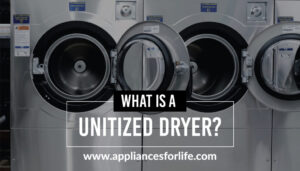
What is a unitized dryer? This is where the washer and dryer are combined. It is a single machine that washes and dries your clothes. Clothes are usually put in a dryer after running their cycle in a washing machine. There are several types of

Top 4 Best Washing Machines Without Agitators
People have been stuck between choosing a washer with an agitator and without an agitator for many years now. It’s not always easy because the component does a great job, but its aggressive wash action puts many people off. In our washing machines without agitators
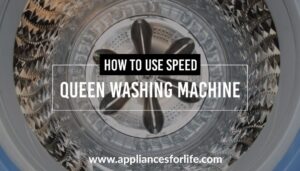
How to Use a Speed Queen Washing Machine?
Speed Queen washing machines may not be as popular as LG, Samsung, or GE washing machines, but they’re worth investing in because they’re very quality machines. If you have one in your laundry room, knowing how to use a Speed Queen washing machine will come

What Appliances Use the Most Electricity in a Household?
Electrical appliances have become a must-have in every home and they’ve become popular in recent years, especially the modern ones with new tech-inspired features being packed with them. As a result of that, the energy consumption in every home has increased greatly, which has left

Top 4 Best Washing Machines for Comforters
Domestic washing machines are more robust than most people think. If you’re looking for the best washing machines for comforters, we’ll be reviewing the best washers for comforters in this article. Top 4 Best Washing Machines For Comforters Comparison Table Since they introduced residential

How To Stop Washing Machine From Shaking?
One of the most annoying issues you can ever face with your washing machine is constant vibration. To best deal with that, you’ll need to know how to stop washing machine from shaking, which is what we’ll be discussing in this article. Living in the

What’s the Difference Between Agitator and Impeller?
Some people purchase washing machines without knowing how well the washer cleans or the method it uses. This has caused most people to ask this popular question – what’s the difference between an agitator and an impeller. Ever since the first residential washing machine was
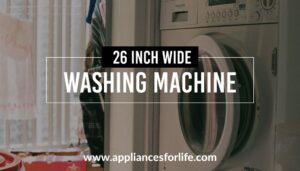
Top 3 Best 26-inch Wide Washing Machines
With washing machines getting very popular with each that passes by, we’re not surprised that people are looking to explore all the available options that are suitable for them. People that love portable washers have been on the look out for the best 26-inch wide
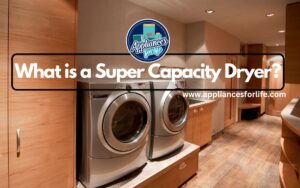
What is a Super Capacity Dryer?
A dryer is one of the dynamic duo that maks your laundry an easy task to do. With a dryer, you will never need to wait hours for your clothes to dry out, evenly. Dryers may not be as flashy as their washer counterpart, but

How to Use a GE Washing Machine?
There’s no talking about one of the most successful American appliances brands without mentioning GE because that’s where the brand belongs. GE has done a great job to keep the United States at the forefront of the production of the best household appliances in the

